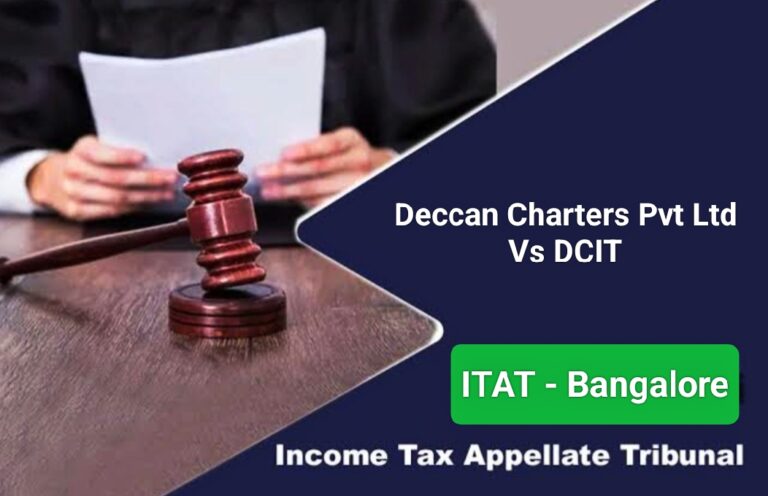The ITAT ruled that, as long as interest-free funds are sufficiently available at the time of advance, disallowance of interest on subsequent loans will not stand.
In this article, we delve into a notable tax judgement of ITAT involving a private limited company engaged in aviation services, specifically focusing on the disallowance of interest expenses under Section 36(1)(iii) of the Income Tax Act, 1961. This case of Deccan Charters Pvt Ltd vs DCIT (ITA No. 1349/Bang/2024) highlights essential issues related to tax deductions on interest expenses for loans, interest-free advances to related parties, and judicial precedents influencing such assessments.
Overview of the Case
The assessee, a private limited company based in Bengaluru, operates aircraft services across multiple locations. For Assessment Year (AY) 2018-19, the company filed its income tax return on October 30, 2018, declaring a substantial loss of INR 10.93 crore. However, during the scrutiny assessment, the Assessing Officer (AO) noticed that the assessee had made interest-free advances to related entities while incurring interest expenses on borrowed funds from banks and other financial institutions. The AO raised concerns regarding these interest-free advances and subsequently disallowed INR 2.57 crore as an expense under Section 36(1)(iii).
Assessee’s Contentions in Appeal
The assessee, dissatisfied with the AO’s decision, appealed to the Commissioner of Income Tax (Appeals) [CIT(A)]. They argued that the advances to a sister concern, M/s. Deccan Emerging Business Ventures Pvt. Ltd., were initially extended during AY 2012-13 when there were ample interest-free funds. The assessee demonstrated, using financial records, that the advances given had been gradually decreasing since that initial disbursement, with no new advances granted in the current assessment year. Therefore, they argued that disallowing the interest expense in AY 2018-19 was unwarranted.
CIT(A)’s Decision and Further Appeal
The CIT(A) did not accept the assessee’s argument, citing insufficient interest-free funds during AY 2018-19. Discontent with the CIT(A)’s stance, the assessee escalated the matter to the Income Tax Appellate Tribunal (ITAT), where they reiterated the adequacy of interest-free funds at the time of the original advance in AY 2012-13. They cited specific data, showing that the outstanding balance on the advance had reduced from INR 38.47 crore in 2012 to INR 22.54 crore by the end of AY 2018-19, demonstrating no further extension of such advances.
Arguments from the Revenue Department
The Revenue Department argued before the ITAT that, under the Companies Act, advances to related parties cannot exceed 60% of reserves and surplus. In this case, the interest-free advance exceeded the statutory limit, implying the need for disallowance. They contended that, since the reserves and surplus were insufficient to cover these advances, the amount could not be treated as derived from own funds alone, thus supporting the AO’s disallowance.
ITAT Decision: Key Takeaways
The ITAT examined the financial statements and noted that the assessee’s reserves and surplus were indeed lower than the outstanding balance of the related party advances. However, the ITAT observed that the outstanding advance was an ongoing balance from prior years, with no new advances granted in the current assessment period. Citing the Karnataka High Court’s judgment in CIT vs. Brindavan Beverages Pvt. Ltd., the Tribunal favoured the assessee’s stance. In case of Brindavan Beverages, the court ruled that, if an assessee has ample interest-free funds during the initial advance period and no subsequent advances are made, disallowance under Section 36(1)(iii) may not be applicable.
The ITAT referenced similar cases upheld by the Mumbai High Court in Reliance Utilities & Power Ltd. and the Gujarat High Court in Raghuvir Synthetics Ltd., which establish that when sufficient interest-free funds exist, disallowance on interest paid on loans need not apply for advances to related parties.
Conclusion
In the end, the Tribunal ruled in favour of the assessee, directing the AO to delete the disallowance under Section 36(1)(iii). This case reiterates that as long as interest-free funds are sufficiently available at the time of advance, disallowance of interest on subsequent loans may not stand. It emphasizes the importance of maintaining clear financial records and understanding judicial precedents to navigate complex tax assessments effectively.
Also Read: Interest Expenses Deduction & It’s Assessment under Income Tax Act
READ MORE
Delhi High Court Rules Against 2 Adjudication Orders for a Single Show Cause Notice
